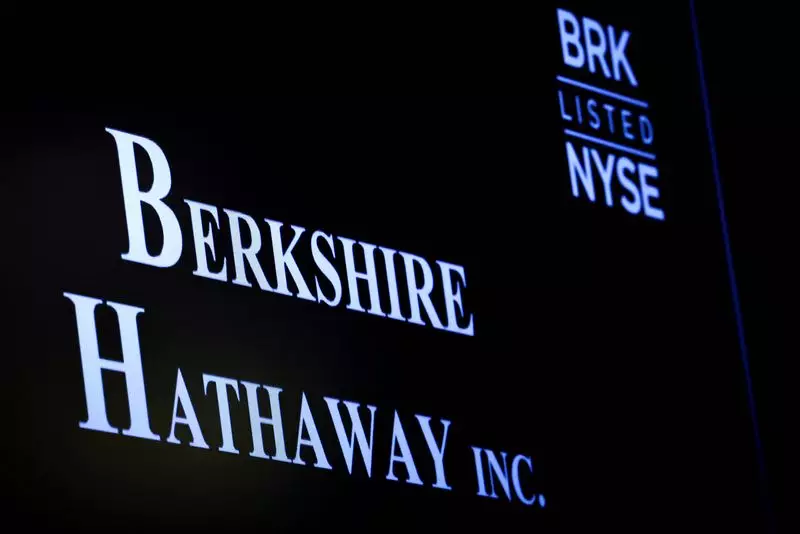Warren Buffett, the iconic CEO of Berkshire Hathaway, has made headlines once again as the firm shows a discernible shift in its investment strategy. Throughout the third quarter of the year, Berkshire Hathaway has significantly reduced its exposure to stocks, particularly unloading a sizeable portion of its holdings in Apple Inc., while escalating its cash reserves to an unprecedented $325.2 billion. This decision is particularly striking given the tech giant’s stature as a cornerstone in Berkshire’s portfolio.
The decision to sell off around 100 million shares of Apple—approximately 25% of its previous holdings—suggests a dramatic recalibration in Buffett’s investment philosophy. Apple remains the largest asset in Berkshire’s collection, valued at an impressive $69.9 billion, yet the firm’s actions echo a broader trend of risk management amidst a market characterized by volatility. The compression of stock exposure is an admission that the market conditions are less favorable, and given Apple’s past consistent performance, this retreat speaks volumes about Buffett’s current outlook.
Despite these stock moves, Berkshire Hathaway’s operational performance reflected challenges in the broader economic climate. The company reported a decline in its quarterly operating profit by 6%, largely influenced by increased liabilities tied to insurance underwriting, specifically due to devastating events like Hurricane Helene and a strengthening U.S. dollar. This dip hints at the unique and inherent risks intertwined with insurance operations, which can be especially exposed to unpredictable natural disasters.
Interestingly, even amid these struggles, certain segments like Geico, Berkshire’s car insurance entity, saw a rise in profitability, albeit tempered by substantial claims expenses. The juxtaposition of higher underwriting losses in some sectors against operational gains in others illustrates the complex nature of managing a diverse conglomerate. With BNSF railroad ramping up consumer goods shipment and Berkshire Hathaway Energy witnessing a drop in operating costs, it reflects the multi-faceted nature of Berkshire’s portfolio, allowing for some resilience against headwinds.
Buffett’s strategy of bolstering cash reserves is indicative of a cautious stance, especially in times of economic uncertainty. With Berkshire’s buying activity dwindling to a mere $1.5 billion worth of stocks—marking the eighth consecutive quarter where the firm has been a net seller—it raises questions about future investments. Furthermore, the decision to refrain from stock buybacks underlines a critical perspective on perceived value; Buffett appears to believe that even Berkshire’s own shares do not represent an enticing investment opportunity.
A significant factor contributing to these strategic choices is the federal tax rate on capital gains, which Buffett recently predicted could likely increase. This forecast likely influenced the decision to sell shares and protect profits while maneuvering within the financial sphere. With evolving economic conditions, Buffett’s cautious blueprint might be a proactive measure in avoiding potential pitfalls.
At 94 years old, Buffett’s years at the helm of Berkshire Hathaway are drawing to a close, leading to speculation regarding leadership succession. The eventual transfer of power to Vice Chairman Greg Abel, aged 62, raises pressing questions about the future direction of the conglomerate. While many investors marvel at Buffett’s time-tested wisdom, there is no telling how Abel’s vision may differ, particularly in the face of an ever-evolving economic landscape.
Berkshire’s diverse business model encompasses not merely stock investments but also various financial services, energy, manufacturing, and retail sectors. Nevertheless, with Buffett’s legacy hanging in the balance, many will closely monitor how the conglomerate adapts to market changes under new leadership.
Ultimately, Warren Buffett’s approach to the third quarter is a reflection of navigating uncertainty in today’s complex financial climate. While the strategic sell-off of stocks—especially a major holding like Apple—might raise eyebrows, it also exemplifies a pragmatic response to current and forecasted market conditions. As Berkshire Hathaway continues to balance its diverse interests, the future remains uncertain, yet hopeful, as Buffett’s prudent legacy pushes forward into a new chapter. The company’s ability to weather economic storms while protecting cash reserves may be what ultimately distinguishes future successes and challenges alike.

